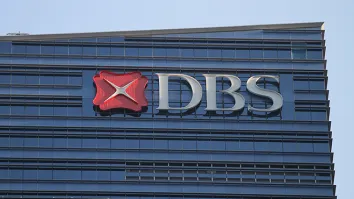
Singapore's system loans slip 0.8% in September as DBU and ACU disappoint
Overall corporate loans declined 1.1%.
Barclays reports that in September, system loans decreased by 0.8% m/m (-1.2% m/m currency adjusted) led by declines in both domestic banking unit (DBU) and Asian currency unit (ACU) loans which dropped by 0.8% and 0.7% m/m, respectively. ACU loans would’ve declined by 1.6%, adjusting for the 0.8% depreciation in the SG$ against the US$.
Here's more from Barclays:
The loan decline m/m was mostly related to general commerce (-3.5%) and financial institutions (-1.8%). Even excluding the decline in general commerce loans, system loans contracted by 0.3% m/m. Overall corporate loans declined 1.1% m/m while retail loan balances were flat.
System deposits grew by 1.1% m/m (0.7% currency adjusted) mainly due to a sharp increase in DBU fixed deposits (+7% m/m). DBU deposits overall rose by +2% m/m as time deposit growth offset a -1.2% m/m fall in CASA deposits.
Time deposits accounted for 39% of DBU deposits, up from 37% in August. DBU. The system loan to deposit ratio (LDR) decreased to 104% (August 2015: 106%) as deposits rose while loans contracted.
While the Singapore banks are facing slower loan demand (low single digit rate in FY15E), we believe margins will remain stable over the next few quarters with potential upside when US interest rates rise. Moreover, market-related fee income could potentially pick up in 4Q15 after the sharp equity market correction and weak investor sentiment in 3Q15, in our view.
Asset quality has so far remained manageable. The banks have seen a few NPL cases related to the fall in commodity prices so far, and NPLs are expected to increase but in a gradual manner.
DBS (OW) continues to be our preferred pick among the Singapore banks as it has a dominant deposit franchise in Singapore, is the most leveraged to rising rates and benefits from currency translation gains from US$/HK$ appreciation against the SG$.
We also like UOB (EW) for its strong capital position and risk management track record given the macro uncertainty. However, a lack of near-term positive catalysts and industry-wide revenue headwinds prevent us from turning more positive.
















 Advertise
Advertise






